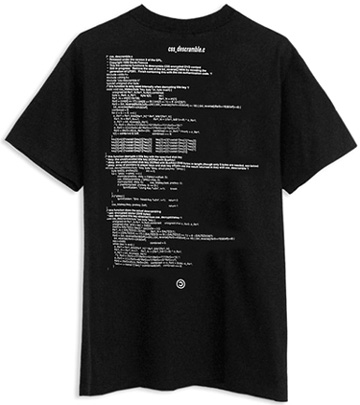The story so far: The light relief in the previous chapter described how the Motion Picture Association of America, combined with a shadowy Japanese-controlled organization known as the DVD-CCA, were furiously trying to stuff the toothpaste of DVD decryption back into the tube of secrecy. Their efforts were aided by a bad U.S. law known as the 1998 Digital Millennium Copyright Act.
The DMCA is not the first piece of bad law affecting the Internet. The Communications Decency Act lasted less than a year before the U.S. Supreme Court struck it down as unconstitutional in 1997. The DMCA is a bad law because it tilts the balance between consumers and copyright holders too heavily toward copyright holders. Many kinds of ordinary legal uses of DVDs, such as playing them with your DVD player of choice on the computer of your choice, have become effectively illegal under the DMCA.
Every once in a while, common sense collides with the law. It's not quite the irresistible force meeting the immovable object because the law must always yield to common sense in the long run. But it can be pretty entertaining in the short run. Take a look at the picture of this T-shirt (Figure 18-1).
The T-shirt contains a few lines of C code on the back, and the DVD Copy Control Association (DVD-CCA) is suing the vendor to try to drive this T-shirt off the market!
The dispute centers around those few lines of C code on the back of the shirt. They are just regular lines of C code, looking like this:
void CSSdecrypttitlekey(
unsigned char *tkey,
unsigned char *dkey) {
int i;
unsigned char im1[6];
unsigned char im2[6]={0x51,0x67,0x67,0xc5,0xe0,0x00};
for(i=0;i<6;i++)
im1[i]=dkey[i];
CSStitlekey1(im1,im2);
CSStitlekey2(tkey,im1);
}
So why all the fuss? The answer lies in a vicious struggle over money, trade secrets, and a new U.S. copyright law affecting DVDs. DVDs (i.e., video films stored on high capacity CDs) hold ordinary MPEG-2 files that have been encrypted. The encryption is called the Content Scrambling System, or CSS. The DVD industry makes a lot of noise implying that CSS helps with protection against pirates. But, shiver me timbers mateys, the CSS encryption has no effect at all on piracy. Pirates just copy the entire disk bit-for-bit and resell them. DVD players don't have any magical way to tell if the same bits are coming from a genuine DVD or a pirate copy.
The CSS encryption is really there to give the DVD industry control over how you play back the titles you bought. If the bits are encrypted, they can only be played on a DVD player that is approved by the DVD industry. The industry can then enforce all kinds of restrictions, from not being able to fast forward past the trailers and adverts at the beginning, to not being able to play DVDs from other countries, to refusing to play content that has gone out of copyright and should therefore be freely available.
The movie and publishing industry has quite a history of rewriting copyright laws to favor itself. The period of copyright protection was originally up to 28 years from date of creation. By the 1920s the law afforded a maximum of 56 years of copyright protection. This period was expanded to 75 years in 1976, after strenuous lobbying from the Walt Disney corporation concerned about losing exclusive rights to the material created by the grandfathers of current employees. Even with the 1976 extension, the copyright on Mickey Mouse would expire on January 1 2004, so in the late 1990s Disney went back for another helping. Congress obligingly rolled over again and retroactively extended copyright another 20 years through the Sonny Bono Copyright Term Extension Act of 1998. Some time in the 2010s, the industry will surely want to reduce consumer rights even further and try to write itself an infinite lifetime on copyright. Even patents, flawed as they are, have a much more limited lifetime.
There are rights other than those of content producers at stake here. America has very strong guarantees concerning freedom of speech, and there are long-standing precedents saying that printed text (even source code) counts as speech. When the deCSS code was printed on a T-shirt, nobody seriously thought they'd be sued over it. Of course, the suit is really aimed at discouraging programmers from spreading knowledge about deCSS, and from playing their DVDs with software that hasn't been approved by the DVD-CCA.
The DVD industry won't achieve those goals. You can't legislate knowledge out of existence. This is the same nonsense that the U.S. government tried a few years ago, classifying some forms of encryption software as “munitions” and thereby regulating their export under the same rules as machine guns, tanks, and artillery pieces. That software ban lasted right up until the time it collided with the need to put encryption in browsers as an enabler for e-commerce. One possible outcome is that the DMCA will be found unconstitutional (i.e. contrary to the most fundamental principles of U.S. law). But until that happens, you can wear your illegal T-shirt with pride—you're striking a blow for freedom of speech, for consumer rights, and for writing and running whatever damn code you like on your own computers.
See also the book Free Culture: How Big Media Uses Technology and the Law to Lock Down Culture and Control Creativity by Lawrence Lessig. This important book can be freely downloaded from http://www.free-culture.cc/freecontent/. Lessig is a Professor of Law at Stanford Law School and founder of the school's Center for Internet and Society. Prior to joining the Stanford faculty, he was the Berkman Professor of Law at Harvard Law School. He is a great advocate for net values, open source code, and the rights of individuals on the internet.

